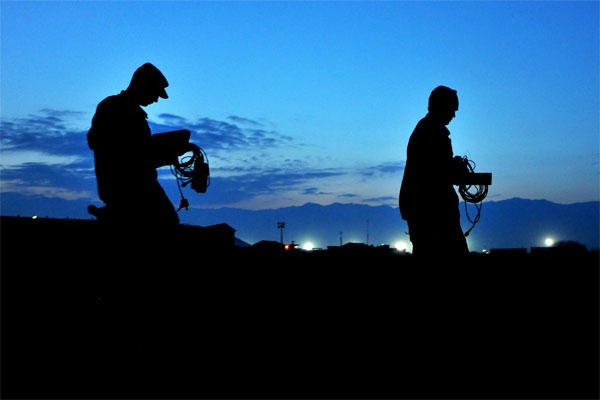BAGRAM AIRFIELD, Afghanistan -- A group of Airmen from the 455th Expeditionary Security Forces Squadron is combining the old school skills of tracking with modern technology to bring a new capability to the fight.
"It stemmed from a lot of research in preparation for our deployment," Staff Sgt. Benjamin DeSantiago said, a 455th ESFS Reaper team tracker. "We thought instead of just simply conducting routine base defense ... why not actually attempt to find the insurgents right on the spot."
DeSantiago credits his team's officer-in-charge, 1st Lt. Joshua Loomis, with gaining approval from leadership for the team to learn the necessary skills. The three-man team would eventually arrive at the tactical tracking operation school on Ft. Huachuca, Ariz.
"We informed the president of the school of our mission and told him what our needs were in preparation for our deployment," DeSantiago said, "(and) he tailored the school solely around air base defense to help us out."
When the Airmen first arrived for training, they did indeed think there were going to be playing cowboys.
"We thought we would end up putting our ears to the ground and listening to the winds for signs of our quarry," DeSantiago recalled.
However, the primitive was soon merged with the modern.
"(The instructor) taught us the proper emplacement of unattended ground sensors," DeSantiago said. "By using these sensors and emplacing them in areas of interest we can focus our patrols."
By the time of their arrival on Bagram Airfield, Afghanistan, the tracker Airmen were ready to put their skills to the test.
"Whenever there is an attack, we act as a quick response force," DeSantiago said. "We are always on call. We go out with the responding team and assess where the insurgents came from and where they went to by tracking the ground spoor (indicators of a human presence), aerial spoor and any ground sign left behind."
While trackers can be found in the Army, they are rarer in the Air Force, a fact these Airmen are proud of to p.
"The instructor informed us that there were only a handful of us in the Air Force that he pushed through his course as certified U.S. Army trackers," DeSantiago said.
On the other hand, having a special mission can bring its own set of challenges.
"There are only three of us certified and our capabilities are unique and new, especially to the base defense mission," DeSantiago said. "So we are learning a lot and improving daily."
However, those that would seek to do harm should beware. The trackers recently completed their first mission, investigating a specific area for insurgent activity.
"We reconned the whole area," Loomis said, " ... looking for vehicle tracks, footprints, trash left behind, so we could limit the search to a specific focus."
Having identified multiple trails that could be used by insurgents, the trackers placed their sensors and will augment them with cameras if the sensors yield results.
Loomis added that the trackers are training other security forces Airmen to expand the number of teams that can go out on future missions.
"We have plans in place to utilize this skill set," Loomis said. "We're pretty excited."


























